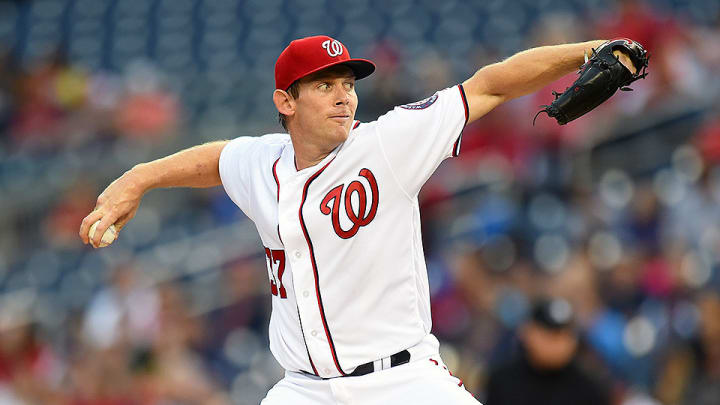Nats lock up Stephen Strasburg in surprisingly team-friendly deal

Get all of Jon Tayler’s columns as soon as they’re published. Download the new Sports Illustrated app (iOS or Android) and personalize your experience by following your favorite teams and SI writers.
Stephen Strasburg may not have been at his best in his start on Monday night against the Tigers, but the Nationals’ ace scored a big win off the field. According to multiple sources (and first reported by the Washington Post's Chelsea Janes), Strasburg has agreed to a seven-year, $175 million extension with Washington, with the 27-year-old righthander getting two rolling opt-outs after the third and fourth seasons of his new contract, as well as performance bonuses for reaching 180 innings each year. The deal is a stunning bit of business for Strasburg and his agent, Scott Boras, as the former No. 1 pick was expected to be the top available prize of this coming off-season’s free agency, and is a coup for the Nationals and general manager Mike Rizzo as he tries to lock up the team’s future.
The 30: Starting pitchers in focus for Week 5 MLB power rankings
Despite the sky-high expectations placed upon Strasburg since he was taken with the first pick of the 2009 draft out of San Diego State University by a moribund Nationals franchise, the righthander has been everything the team could have asked for in his six-plus seasons. Strasburg has an ERA of 3.07 in 825 2/3 career innings and has posted an ERA+ of 114 or better and a strikeout-per-nine rate of 9.0 or higher in every one of his major league seasons. Since the start of 2010, only five pitchers with 800 or more innings pitched have an ERA+ better than Strasburg’s career 127 mark. One, interestingly enough, is Felix Hernandez, who signed a seven-year, $175 million extension with the Mariners before the 2013 season at age 26.
The big problem for Strasburg in his career has been durability, as he has missed large chunks of time due to injury. Last year, he managed just 127 1/3 innings due to ankle, back and neck problems, but the most notable issue was a torn elbow ligament suffered in his debut 2010 season that led to Tommy John surgery. That procedure cost Strasburg all but the final month of the 2011 season and was a factor in his controversial innings limit and shutdown the following year, when Boras and the Nationals held him to 159 1/3 innings and kept him from pitching in the playoffs for a team that finished first in the National League East and led the majors with 98 wins but lost the Division Series to the eventual World Series champion Cardinals.
• JAFFE: David Ortiz eyes HR milestones in terrific start to final season
That elbow surgery is well in Strasburg’s past by this point, and he has shown little to no ill effect from the ligament reconstruction. In 2014, he led the NL in strikeouts with 242 as he notched the only 200-inning season of his career to date, and though his velocity has dropped from his pre-surgery days, he still throws very hard. Last year, he averaged 95.4 mph with his four-seam fastball, the seventh-highest mark among all starters with at least 120 innings pitched, and so far this season, his 94.7 mph average is ninth. Velocity aside, there’s no doubting Strasburg’s results this season: Despite Monday’s uneven effort against the Tigers (four earned runs allowed in seven innings with 11 strikeouts), the righty has a sterling 2.76 ERA and 2.24 FIP with 10.65 strikeouts per nine in 49 innings.
Cubs making history and earning believers with red-hot start
With Strasburg’s combination of stuff and pedigree, there’s no question that he would have been in line for a tremendously lucrative deal had he entered free agency. That’s particularly true given the rest of the market: The next best pitcher set to test the free-agent waters is veteran Jered Weaver, who holds a 4.72 ERA through 34 1/3 uninspiring innings this season for the Angels and has an injury history as problematic as Strasburg’s, not to mention a fastball that barely cracks the speed limit. After him, the list is a motley mix of fellow past-their-prime veterans and injury risks: C.J. Wilson, Andrew Cashner, Mat Latos and Jeremy Hellickson are names that will have general managers in need of pitching burning up the phone lines looking for trades instead of spending their free-agent dollars. That group would be improved somewhat if Scott Kazmir and James Shields exercise their opt-outs, or if 2017 options on Gio Gonzalez or Edinson Volquez are not picked up. Regardless, it remains an uninspiring market—one that Strasburg would have controlled from the first day of free agency.
That’s what makes this extension such a surprise. Despite his injury history, Strasburg was set to hit free agency as a former No. 1 pick at just 28 years of age with a career ERA barely above 3.00. To get an idea of what he could have earned this winter, he simply needed to look down the Nationals’ dugout at fellow starter Max Scherzer, who scored a seven-year, $210 million deal from Washington when he became a free agent after the 2014 season. Scherzer, of course, had a Cy Young to his name when he signed his contract, but the veteran righthander was 30 years old with over 1,200 innings on his arm when he put his pen to paper. The same was true of fellow aces David Price (30 years old, 1,441 2/3 career innings) and Zack Greinke (32, 2,094 2/3) when they signed their respective $200 million deals this past off-season. Or Strasburg could have considered the $215 million extension Clayton Kershaw signed with the Dodgers at age 26 before the 2014 season. Those pitchers may be more accomplished or proven than Strasburg (and with better injury histories, to boot), but it’s not hard to see $175 million as Strasburg’s floor this winter, especially given how thin the pitching market is.
Making this move even more confounding for Strasburg is the presence of Boras, an agent notorious for rejecting extensions and shepherding his clients toward free agency in order to get every dollar possible for them. The last time a Boras client agreed to stay with his team before hitting free agency was in 2013, when shortstop Elvis Andrus signed an eight-year, $120 million deal to stay with the Rangers; the last pitcher to do so was Weaver, who signed a five-year, $85 million extension with the Angels midway through ’11. As recently as February, meanwhile, Boras told Fox Sports' Jon Paul Morosi that Strasburg and the Nationals were not discussing a contract, instead insisting that he and his client would only talk about a long-term deal after the 2016 season. “He’s going to pitch, and we’ll see where it goes from there,” Boras told Morosi. “It’s something we’ll be discussing at the end of the year.”
Cubs’ strategy of pitching around Bryce Harper pays off in sweep
Why the change in plans then? The key here is the presence of the opt outs, which offer Strasburg the opportunity to try free agency after the 2019 or ’20 seasons, by which point he will have banked at least $75 or $100 million. Should he continue to perform at an ace level and show that his injury issues are behind him, Strasburg can hit the market at either age 31 or 32 with the opportunity to land another nine-figure contract. If injuries or poor performance strike between now and 2019, Strasburg will still get his money. In essence, Strasburg’s extension is insurance against injury submarining his free-agency debut while still giving him the opportunity to enjoy the fruits of the free market if he can maintain his form for the next three-plus seasons.
A calculated bet on the part of Strasburg and Boras, the deal is a clear win for the Nationals, who lock up a key piece of their rotation at a below-market price. The combination of Strasburg and Scherzer (both now signed through 2021) gives Washington one of the best 1–2 punches in the game, and to that pairing, the team can add Gonzalez (who has a 2.19 ERA through 37 innings this season and a wildly affordable $12 million option for next season), 23-year-old Joe Ross (1.23 ERA in 29 1/3 innings and under team control through ’21), Tanner Roark (2.03 ERA in 44 1/3 innings and signed through ‘19) and, eventually, top prospect Lucas Giolito. That rotation certainty and the low cost of the last three pitchers should allow the Nationals to spend elsewhere as needed to bolster the roster.
The deal with Strasburg is also a rare instance of the Nationals retaining a homegrown player. Before the 2012 season, Washington signed then-third baseman Ryan Zimmerman to a six-year, $100 million extension (one that didn’t kick in until ’14, and one that the Nationals likely wish they had never made, given his rapid decline in productivity and health since the end of ’13). Since then, however, Washington has said goodbye to shortstop Ian Desmond and starter Jordan Zimmermann, both of whom left the team after the 2015 season. In both cases, the Nationals offered long-term extensions to each player, but each was turned down; Desmond in particular likely regrets rejecting the seven-year, $107 million deal Washington offered him in 2014, as he struggled through the next two years before landing in free agency with a resounding thump and ultimately settling for a one-year pillow contract with the Rangers (one that forced him to move to leftfield). Zimmermann, meanwhile, turned down a five-year, $105 million pact before the 2015 season but beat that in free agency, earning five years and $110 million with the Tigers; fittingly enough, he was back in D.C. on Monday as Detroit faced the Nationals.
• CORCORAN: Chapman's return won’t be enough to save the Yankees
With Strasburg now secured for the foreseeable future, the Nationals’ attention must now turn to another homegrown star and Boras client who will also be seeking nine figures when his free agency time comes: Bryce Harper. Though the 23-year-old Harper is still under team control through the 2018 season, if he reaches the free-agent market, the defending NL MVP will command a contract the likes of which baseball has never seen. Harper, who is hitting a staggering .260/.434/.620 with 10 homers through 136 plate appearances this year, is set to reach free agency at just 26 years of age. If he’s healthy, he is a mortal lock to surpass Giancarlo Stanton’s $325 million deal with the Marlins and will likely end up costing nearly half a billion dollars over at least eight years. In other words, the Nationals have their work cut out for them in trying to convince Harper and Boras to eschew a record-setting contract for an extension—one that has virtually no shot of being anywhere near as team friendly as Strasburg’s.
Such a deal may end up being impossible—after all, it’s hard to see Harper turning down the chance to make that kind of money—but the extension for Strasburg should at least raise the hopes for Nationals fans that the team is serious about paying for its stars and has the ability to do so. Regardless of whether or not Harper walks, however, Washington has secured an important part of its future in Strasburg, as the team looks to deliver on its roster’s tremendous promise and continue the quest to capture the franchise’s first World Series—a charge that the Nationals hope Strasburg will lead for quite some time.
